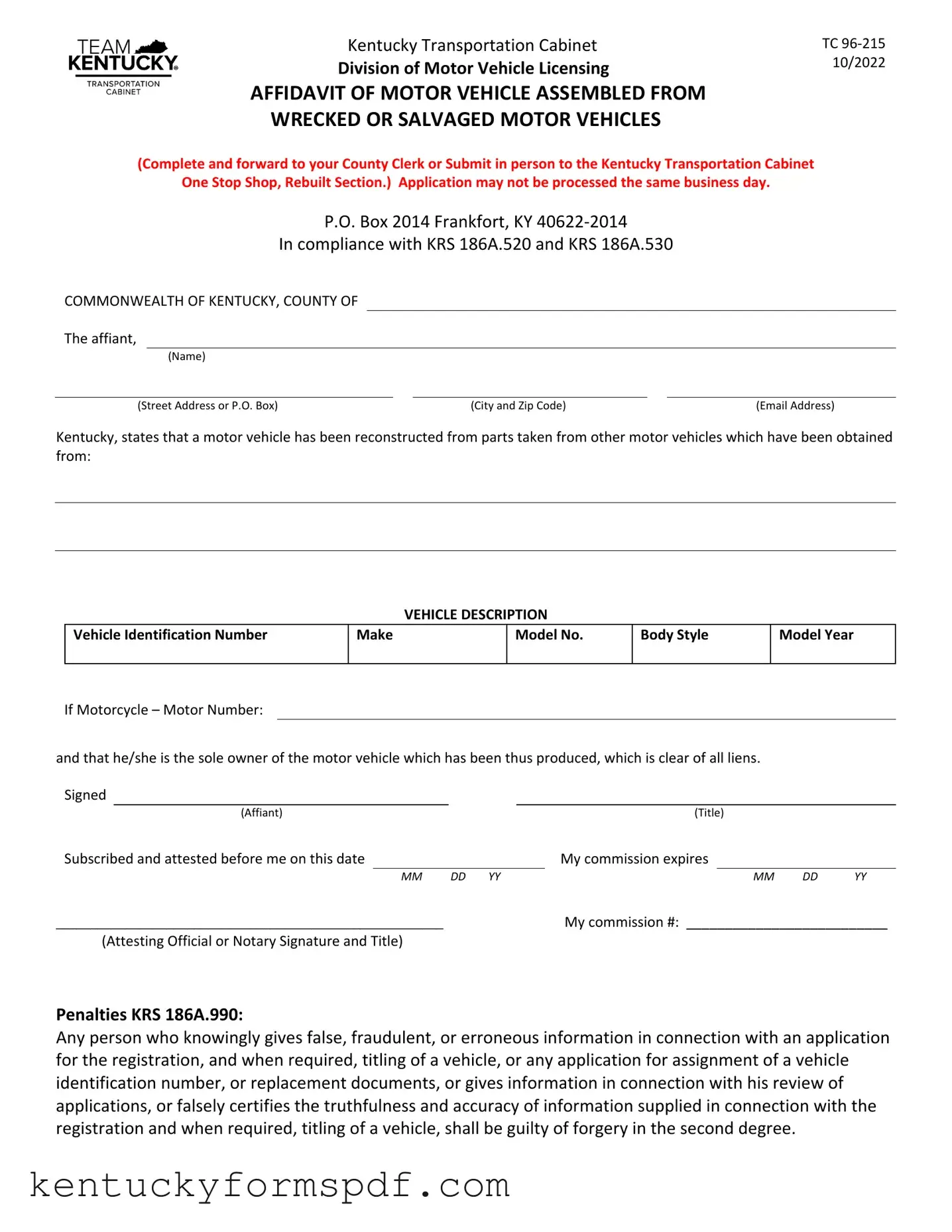The Kentucky TC 96-182 form, known as the Application for Title or Registration, is closely related to the TC 96-215. Both documents are essential in the process of titling and registering a vehicle in Kentucky. The TC 96-182 is often required alongside the TC 96-215 when a vehicle has been reconstructed from salvaged parts. This form collects necessary information about the vehicle and its ownership, ensuring that all legal requirements are met before a title can be issued.
The TC 96-191 form, or the Affidavit of Total Consideration, serves a similar purpose in the vehicle registration process. It is used when there is a need to document the total consideration paid for a vehicle. This affidavit may be required in conjunction with the TC 96-215 when the vehicle's ownership is being transferred, ensuring that all financial aspects of the transaction are transparent and legally binding.
The TC 96-204 form, which is a Lien Termination Statement, is another document that parallels the TC 96-215. This form is necessary when a vehicle has an existing lien that needs to be resolved before a new title can be issued. It helps to clear any financial claims against the vehicle, thereby allowing the owner to proceed with the registration of a rebuilt vehicle.
The TC 96-205 form, known as the Odometer Disclosure Statement, is important for vehicles that are less than ten years old. This document is often required to accompany the TC 96-215 to ensure that the odometer reading is accurately reported. This helps prevent fraud and ensures that the buyer is aware of the vehicle's mileage history.
The TC 96-206 form, or the Application for a Duplicate Title, is similar in that it addresses issues related to vehicle ownership documentation. If the original title has been lost or destroyed, this form allows the owner to apply for a duplicate title, which can be essential for completing the registration process after a vehicle has been rebuilt.
The TC 96-207 form, which serves as a Bill of Sale, is another document that can complement the TC 96-215. It provides a record of the transaction between the seller and the buyer, detailing the sale of the vehicle. This document can be crucial for establishing ownership and the legitimacy of the transaction, especially when salvaged parts are involved.
The TC 96-208 form, known as the Affidavit of Ownership, can also be seen as related to the TC 96-215. This form may be necessary when the vehicle's title is not available, and it helps establish the ownership of the vehicle being registered. It serves to affirm the owner's claim to the vehicle, which is especially relevant in cases where parts from multiple vehicles are used.
The TC 96-209 form, or the Notarized Statement of Vehicle History, is another document that supports the TC 96-215. This form provides a detailed history of the vehicle, including any previous accidents or damages. This transparency is important for the registration process, especially when the vehicle has been rebuilt from salvaged parts.
The TC 96-210 form, the Application for a Special License Plate, can also be relevant when registering a rebuilt vehicle. If the owner wishes to obtain a special license plate for their vehicle, this form may be required in conjunction with the TC 96-215. It ensures that all aspects of the vehicle's registration are handled simultaneously.
For those looking to understand the nuances of ownership transfer, the comprehensive guide to ATV Bill of Sale requirements provides essential insights into documenting sales effectively in New Jersey.
Finally, the TC 96-211 form, which is the Request for Vehicle Inspection, is important for vehicles that have been significantly altered or rebuilt. This inspection verifies that the vehicle meets safety and regulatory standards. It is often a prerequisite for the approval of the TC 96-215, ensuring that all rebuilt vehicles are safe for the road.

